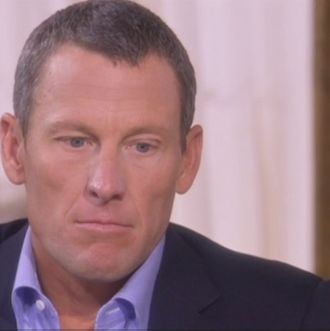
Lance Armstrong reportedly reduced 100 Livestrong Foundation staffers to tears on Monday with his “heartfelt and sincere” apology, but whatever he said then did not come across in his long-awaited confession to Oprah Winfrey. Armstrong said what one does when issuing a mea culpa to the Queen of Daytime — he admitted that he acted like a “jerk,” a “bully,” and an “arrogant prick,” and declared “all the fault and all the blame here falls on me.” However, after finally admitting to the world that he used performance-enhancing drugs throughout his career, he avoided getting into much detail. Armstrong claimed he wasn’t answering certain questions because he didn’t want to implicate others, and in some instances he simply couldn’t recall the specifics in the long saga of lies and coverups. More troublingly, he seemed somewhat removed from his own story, appeared to have trouble empathizing with those he lied to, and admitted to feeling no moral compunctions when he was still doping. “It did not even feel wrong?” asked Oprah. “It’s scary,” said Armstrong. “Did you feel bad about it?” she said. “No. Even scarier,” he answered. “Did you feel you were cheating?” she asked. “No,” he said. “Scariest.”
Oprah kicked off the show with a series of yes or no questions, quickly getting Armstrong’s rumored confession out of the way: “Did you ever take banned substances to enhance your cycling performance?” “Was one of those banned substances EPO?” “Did you ever blood dope or use blood transfusions to enhance your cycling performance?” “Did you ever use any other banned substances like testosterone, cortisone, or human growth hormone?” “In all seven of your Tour de France victories, did you ever take banned substances or blood dope?” The answer to every one of her questions was a somber yes, except for the last. “In your opinion, was it possible to win the Tour de France without doping, seven times in a row?” she asked. “Not in my opinion,” said Armstrong.
Armstrong insisted repeatedly that he didn’t want to make excuses, but he slipped in a few anyway. When Oprah brought up the U.S. Anti-Doping Agency’s accusation that he was the leader of the “most sophisticated doping program on the planet,” he pointed out that there have been larger doping operations in sports. “I didn’t invent the culture,” he said. “But I didn’t try to stop the culture.” He also used his cancer to explain some of his actions, saying that losing a testicle helped him justify using testosterone, and more bizarrely, that cancer turned him into a bully. “I was always a fighter,” he said. “Before my diagnosis, I was a competitor, but not a fierce competitor. Then I said I will do anything I need to do to survive. Then I brought that ruthless, win-at-all-costs attitude into cycling.” As Oprah pointed out, he used performance enhancing drugs before he was diagnosed.
The fact that Armstrong would confess was widely reported before the interview, and as the New York Times’ excellent live blog noted, what those who have followed his story were really looking for was “a specific apology for the lives he ruined in order to keep his secret a secret.” “His career was maintained and built by destroying not just fellow riders, but their spouses as well,” wrote David Carr. When Oprah brought up Emma O’Reilly, a masseuse Armstrong called a prostitute when she went public with what she knew about his doping, he said “She’s one of these people that I have to apologize to,” but didn’t issue a clear apology. Even worse was his response to Betsy Andreu, the wife of his former teammate Frankie Andreu, who said she heard Armstrong list performance-enhancing substances he’d used while speaking with a doctor. First he said he’d apologized for treating her so viciously, but he wouldn’t discuss what was said in their phone conversation. Then he decided to share one quip. “I did call her crazy … I called her crazy, I called her a bitch, but I never called her fat,” he said with a smile. “She thought I’d said ‘You’re a fat, crazy, bitch.” It seems he was trying to lighten the mood, but unsurprisingly, the fat joke didn’t go over well with Oprah.
At the end of the 90-minute interview, it was still unclear why Armstrong suddenly realized the error of his ways. How did he go from being a man who literally had to look up the definition of the word “cheat” at the height of the scandal (“The definition is to gain an advantage on a rival or foe,” he recited. “I didn’t view it that way. I viewed it as a level playing field.”) to someone who truly understands and appreciates how many people he hurt with his lies? Maybe that’s covered in the second half of the interview, which airs tomorrow night. Or perhaps Armstrong was just finally caught — or rather forced to admit his mistakes when he was banned from competing in Olympic sports — and this is just the latest thing he needs to do to survive.
This post has been updated throughout.





























